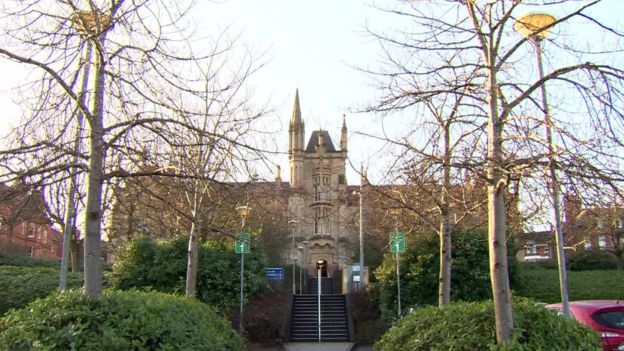
Magee campus at the Ulster University in Derry
The report, entitled ‘Finding common ground, building community: strengthening and stimulating tertiary regional collaboration in the north-west of the island of Ireland’ was published today.
The central point in the document about the future of higher education (HE) provision in the north west finds that growth could conceivably be achieved by expansion of the current North-West Tertiary Education Cluster with “independent oversight”.
But, a “more ambitious option” would be “the development of a federal cross-border tertiary education institution also merits serious consideration”.
It adds: “Such an institution would be made up of existing constituent institutions or campuses thereof but with an overall governance structure involving coordinated oversight of planning across the region.
“In such a scenario, each jurisdiction would continue to be responsible for the funding of its respective colleges and campuses.”
The “skewed distribution of HE (Higher Education) provision” in Northern Ireland is highlighted in the report with over 80% of places being based in the capital city, Belfast, which is in “sharp contrast” to that found in the other jurisdictions within these islands.
Derry still only has 5,000 students after a 60-year campaign for a full-sized university and many broken commitments to expand the campus to 10,000 students.
“Northern Ireland, unlike the other jurisdictions, has no independent oversight of HE or tertiary education provision,” the report states.
“It is difficult to envisage a HE oversight body supporting the current geographically skewed distribution of HE places or concluding that such concentration would be in the interests of economic and cultural development or social cohesion.
“It has been argued, based on analyses of regional HE strategies across a range of countries, that a regional representative body helps to ensure the retention of a regional mission and reinforces diversity and resilience.”
The Derry University Group, which has been campaigning for an independent institution, described it as “a massively-important paper”.
The group added: “It could mark the start of a generational shift in terms of regional balance, higher education, and all-island collaboration.
“Well done to The Royal Irish Academy for its vision and determination.”
The research document, with collaboration from the Academy’s partners in the Celtic Academies Alliance (Royal Society of Edinburgh and the Learned Society of Wales), also examines regional support for third-level education across the devolved nations of Scotland, Wales and Northern Ireland, and Ireland.
It explores the potential for, and impact of, place-based collaborative approaches to tertiary education provision.
The report highlights the historic lack of investment across both jurisdictions in the greater north-west of the island of Ireland.
While the report focuses on higher education (HE) provision, the investment deficit is equally apparent in infrastructure generally, including transport (road, rail, air).
It also notes positive initiatives in the greater north-west including the establishment of the Atlantic Technological University with campuses in Donegal, Sligo and Mayo, the development of the medical school at the Magee campus of Ulster University, and the recent announcement of a Magee taskforce to plan the growth of the campus to 10,000 students.
Also noteworthy is the establishment of the North-West Tertiary Education Cluster (NWTEC) to promote collaboration between constituent partners. The inclusion of further education within the remit of the NWTEC is welcomed.
The report notes that the economic, social and cultural benefits associated with tertiary education cannot be fully realised without parallel infrastructure development, and the commitment to significantly enhanced transport facilities in the west and north-west of both jurisdictions will be an essential step forward in this regard.
The report comments that relative underinvestment in tertiary education in the greater north-west has had major negative consequences for the development of the region and that the rectification of this anomaly will require major joint affirmative actions by the Irish and UK governments and Northern Ireland Executive.
Experts found this should involve the development of a clear vision and programme to enable the region to fulfil its potential and find its niche within the economies of Northern Ireland and Ireland.
It notes that, ultimately, spatial planning of tertiary education and other development is a responsibility of governments and that it is unrealistic and unfair to delegate such planning to the priorities of tertiary institutions which will, inevitably, have many competing pressures.
The report comments on the annual ‘brain drain’ of university students leaving Northern Ireland to study in Great Britain.
It states that commitment to expanding higher education in the north-west of Northern Ireland should not only involve a relaxation in the Maximum Student Number (MaSN) cap, but should be accompanied by affirmative action to increase, for a transitional period at least, incentives for students to study there.A
Apart from offering attractive programmes in the north-west, other initiatives should be considered. These include offering discounted fees or increasing student maintenance support to students. Also, the FE sector should have a significantly expanded role in plans to expand HE provision as part of a coordinated tertiary education strategy for the north-west region.
The report concludes that the future development of the greater North-West requires effective cross-border planning of tertiary education with enhanced concurrent and coordinated funding from both jurisdictions.
The report recommends that a feasibility study examining the options available should be commissioned by the Irish and UK governments and the NI Executive as an important next step.
The document will be the focus of a one-day conference organised by the John and Pat Hume Foundation which will take place on May 13 at the Atlantic Technological University’s Letterkenny campus in Donegal.
Tags:




